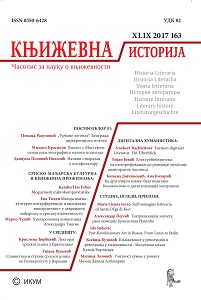Mogućnosti mikrokomparatistike
The Possibilities of Microcomparative Research
Author(s): Katalin Has FeherSubject(s): Hungarian Literature, Serbian Literature
Published by: Институт за књижевност и уметност
Keywords: comparative literature;Austro-Hungarian Monarchy;Central Europe;Balkan;multiculturalism;
Summary/Abstract: The newest comparative-literature finds in the works of David Damrosch, Franco Moretti, Pascale Casanova and others are strongly linked with Goethe’s concept of Weltliteratur. As a result of the reduction, selection and ideological globalization, marginalized literatures of small groups and minorities fell out of the world canons.The authors of such texts can only rise to the status of “world literature” after being translated into a world language, which is, in most cases, English. This is also valid for the national literatures of smaller nations: from a global perspective, the literatures of small nations – with a special regard to those of the 19th century – remain either invisible or, due to the lack of proper terminology, are labelled nationalist and as such,seem of less interest. This article explores the intercultural connections in the works of a Romanian (Ioan Slavici), a Hungarian (János Arany), and a Serbian (Jovan JovanovićZmaj) authors by mapping the ethnic relationships in the Austro-Hungarian Monarchy during the 19th century and shows the possibility and necessity of a Central-European and Balkan micro-comparative research method based on a thorough knowledge of the Romanian, Hungarian and Serbian languages and cultures. The analysis of the abovementioned texts shows that the ethno-pragmatical, ethnopolitical, ethnocultural and ethno-medial discourses introduced in this paper can separate the pragmatic, political, cultural, sociological and biographical aspects. However, these discourses can also be combined. Such analyses can best help the exploration of the nationalistic texts and not their exclusion, because the scientific processing and the description of the scientific terminology pertaining to the different ways of belonging to a nation, as well as that of “nationalism”, need to be more precisely defined.
Journal: Књижевна историја
- Issue Year: 49/2017
- Issue No: 163
- Page Range: 87-107
- Page Count: 31
- Language: Serbian

